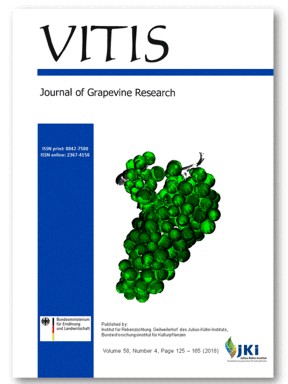Analysis of salinity tolerance of Vitis vinifera 'Thompson Seedless' transformed with AtNHX1
DOI:
https://doi.org/10.5073/vitis.2018.57.143-150Keywords:
sodium chloride, potassium, grape, transgenic, hydroponics.Abstract
Several transgenic plant species expressing AtNHX1, coding for a vacuolar Na+/H+ antiporter from Arabidopsis thaliana, have shown their ability to cope with salinity. The aim of this study was to analyze the response of Vitis vinifera cv. 'Thompson Seedless' transformed with AtNHX1 to salt stress, using soil substrate or hydroponic media, and to compare the response with untransformed 'Thompson Seedless' and allegedly tolerant 'Criolla' cultivars: 'Pedro Giménez' and 'Criolla Chica'. 'Thompson Seedless' embryogenic calli were transformed with Agrobacterium tumefaciens carrying AtNHX1 under the control of CaMV 35S promoter. Transgenic and untransformed plants were grown in a greenhouse under hydroponics or in pots with soil, and were subjected to increasing concentrations of sodium chloride (NaCl) up to 150 mM for a period of 7 weeks. Growth and toxicity symptoms were less affected in transgenics as compared to the untransformed grapevines, and transgenic lines had higher shoot length, leaf area and dry weights at the end of the experiment. Root concentrations of Na in transgenics were similar or lower than that observed in untransformed genotypes. Growth impairment and toxicity symptoms were observed in all genotypes under both conditions, but effects were more severe in plants growing with hydroponic culture. Potassium content and shoot to root dry weight ratio decreased with NaCl in hydroponics but not in pots. 'Criolla' cultivars grew less than the other genotypes, although 'Pedro Giménez' always exhibited highest shoot/root ratios.
Downloads
Additional Files
Published
Issue
Section
License
The content of VITIS is published under a Creative Commons Attribution 4.0 license. Any user is free to share and adapt (remix, transform, build upon) the content as long as the original publication is attributed (authors, title, year, journal, issue, pages) and any changes to the original are clearly labeled. We do not prohibit or charge a fee for reuse of published content. The use of general descriptive names, trade names, trademarks, and so forth in any publication herein, even if not specifically indicated, does not imply that these names are not protected by the relevant laws and regulations. The submitting author agrees to these terms on behalf of all co-authors when submitting a manuscript. Please be aware that this license cannot be revoked. All authors retain the copyright on their work and are able to enter into separate, additional contractual arrangements.



